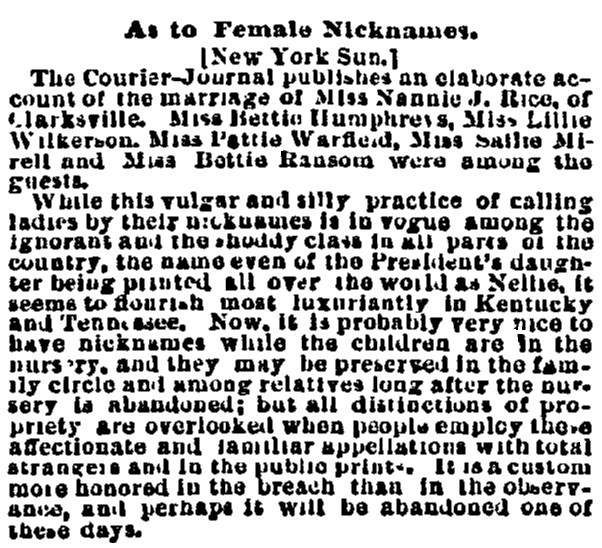Introduction: Gena Philibert-Ortega is a genealogist and author of the book “From the Family Kitchen.” In this blog article, Gena shows how expanding your name searches to include nicknames can discover records about your ancestors you never found before.
Finding your ancestor in old newspapers, such as GenealogyBank’s Historical Newspaper Archives, isn’t always as easy as it sounds. Sure, you can search by a given name and sometimes find your ancestor right away. Other times you need to try variations and common misspellings of their name before getting good search results. But if even then you come up empty, what do you search on next?
Try Nicknames
Do you have a nickname? Maybe your nickname is based on your actual given name. Perhaps it has to do with a characteristic or physical trait you possess. You may have earned your nickname playing sports or in the workplace. Sometimes a nickname may make absolutely no sense. In my case, my paternal grandfather gave me a nickname shortly after I was born based on his miss-hearing of my actual middle name. That nickname would make no sense to anyone (and no, I won’t tell you what it is) but it was always the name he used to refer to me.
A person can gain a nickname for all kinds of reasons, including: ease of pronunciation; to distinguish between two family members with the same name; and in some cases to call out a negative trait.
The most important thing to remember about nicknames is that they could have also been used in print when a newspaper referred to your ancestor. Have you given some thought to searching for your ancestor using a nickname?
You Say Mary, I Say Polly
Probably the most familiar use of a nickname is one that simply substitutes one name for a person’s given name. Throughout history, there have been some standard names substituted for “proper” given names. Case in point: Mary. Mary could be May, Mimi, Molly or Polly. And of course she could have been just Mary, Mary Ann or Mary Jane.
While these nicknames may have seemed childish to some – and they certainly were to the writer of this 1875 newspaper article – in reality it’s possible the nickname was used all of the person’s life. This writer seems annoyed at the use of such familiar names as “Bettie,” commenting:
While this vulgar and silly practice of calling ladies by their nicknames is in vogue among the ignorant and the shoddy class in all parts of the country…

Are you searching on all variations of your ancestor’s written name, including nicknames? Their name may have been abbreviated to a form considered archaic to our modern written language, such as “Jno” for John, “Wm” for William or “Geo.” for George. Previous generations’ nicknames may make little sense to us today. Sarah being referred to as Sally is one such example. Many modern people are confused about why Dick is a nickname for Richard, but according to an online article by David K. Israel, 12th and 13th century nicknames for Richard included Rich and Rick as well as rhyming versions of those names – including Dick.*
In order to improve your chances of finding your ancestor in the newspaper (and other records), it’s important to become familiar with nicknames for a given name. One way to do this is to consult a resource list on nicknames like the FamilySearch Wiki page, “Traditional Nicknames in Old Documents – A Wiki List,” or “A Listing of Some Nicknames Used in the 18th & 19th Centuries” from the Connecticut State Library. You can also read more about nicknames in Christine Rose’s book, Nicknames: Past and Present.
Boy, They Weren’t Very Original!
Do you ever get tired of ancestors who seem to use the same few given names generation after generation? Recycling the names William and John, or Elizabeth and Mary, makes it very difficult to trace a family tree. In some cases re-using a name or favoring certain names might be due to a tradition like naming a child after a saint. You may stumble upon a whole family that has used one singular given name, as in the case of one branch of my family where all the daughters share the name Maria but used their middle names in day-to-day life. This is another example of why searching newspapers for variations of your ancestor’s name, such as middle names or nicknames, is so important. Don’t forget to look for home sources or conduct family interviews to uncover a person’s possible nicknames.
Nicknames can be an important distinguisher for those who are given the same name as a parent, grandparent or older relative. A newspaper article may refer to someone as “Junior” or “Senior.” While referring to someone as Junior or the Second (II) may seem straightforward, a more uncommon nickname could be utilized to refer to someone named after a previous generation or who carries the same name held by successive generations. For example, Skip may be the nickname of someone named after their grandfather but not their father.
“Billy the Kid” & “Gorgeous” George
We are all familiar with nicknames that are substitutes for both a given name and surname. A good example is Billy the Kid. Looking for articles using his given name, Henry McCarty, or his alias, William H. Bonney, might not yield as many returns as searching for his moniker, Billy the Kid.
Billy the Kid wasn’t the only desperado who ditched his given name. Nicknames were seemingly so popular among those committing crimes that the U.S. District Clerk’s Office kept track of defendant’s actual names and nicknames. Researching a black sheep ancestor? Make sure to use both his or her “real” name and their nickname to find relevant articles.
One way to incorporate nicknames in your search is to consider your ancestor’s descriptive nickname substituting for a first or middle name, offset with quotes, as is often done for people like athletes or criminals.
This 1962 sports example of a wrestler named George “Gorgeous” Grant shows the difficulty that can arise when searching on a name. I’ve also seen a nickname listed with parenthesis in the middle like George (Gorgeous) Grant in genealogically-rich articles like obituaries. So make sure that you search on multiple versions of a name including just the nickname and the surname. And while exact phrase searches are important, incorporate other searches as well.
When you aren’t sure of a family member’s nickname, it can be beneficial to try a surname search and include other keywords that can assist you in discovering that nickname. Remember that on GenealogyBank, in addition to keywords, you can narrow your search by place, date, newspaper title and even type of article.
Before you start your next family history research project, keep in mind the importance of having a list of name variations that includes all the various nicknames and versions of your ancestor’s name, as well as possible misspellings.
————————
* “The Origins of 10 Nicknames,” by David K. Israel. Mental Floss: http://mentalfloss.com/article/24761/origins-10-nicknames
Related Name Search Articles:
